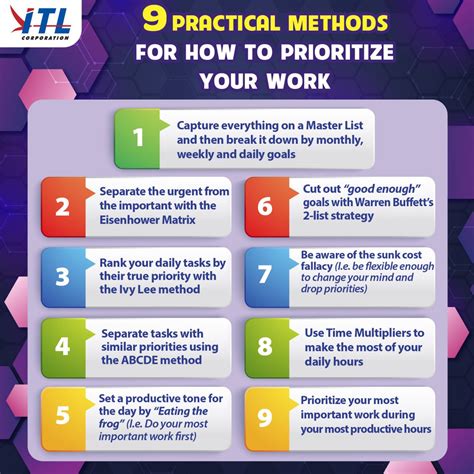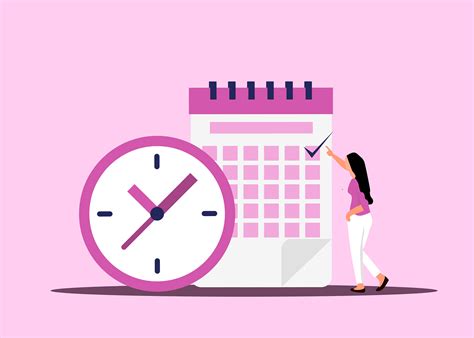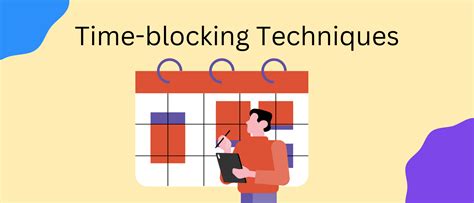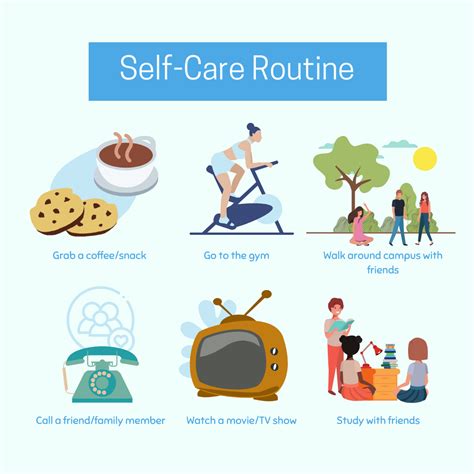Do you often find yourself overwhelmed with a never-ending to-do list and a constant sense of urgency? Are you struggling to make the most out of your precious hours in a day? Look no further, as we delve into the art of optimal time utilization, providing you with invaluable insights and strategies to take control of your schedule like never before.
In today's fast-paced world, effective time management has become an essential skill for achieving personal and professional success. It involves the ability to prioritize tasks, eliminate distractions, and devote dedicated time to important activities. By utilizing the right techniques and adopting a structured approach, you can create a harmonious balance between work, leisure, and personal commitments.
1. Enhance Focus and Concentration
In order to maximize your productivity, it is crucial to develop a laser-like focus on the task at hand. Minimize external disturbances, such as noise or electronic devices, and create a conducive environment that promotes deep concentration. Engage in techniques like the Pomodoro Technique, which advocates alternating periods of intense focus with short breaks to optimize your cognitive performance.
Feeling overwhelmed or easily distracted? Try utilizing tools such as noise-cancelling headphones or installing website blockers to maintain your concentration levels and prevent time-wasting.
2. Prioritize and Delegate
Not all tasks hold equal significance. Understanding the difference between urgent and important tasks is vital to effective time management. Prioritize your to-do list by identifying tasks that have a high impact on your goals and tackle them first. Delegate tasks that can be efficiently handled by others, freeing up your time to focus on tasks that require your expertise or attention.
Remember, attempting to accomplish everything at once is a recipe for burnout. Delegate responsibly and hand off tasks to trusted colleagues or employees who are capable of handling them competently.
3. Embrace Proactive Planning
One of the secrets to mastering time efficiency lies in proactive planning. Take a few moments each day to assess your goals and prepare a detailed schedule or task list. Break down complex tasks into smaller, manageable steps, and assign realistic deadlines for each component. By planning ahead, you minimize the chances of unexpected setbacks and maintain a clear roadmap to success.
Consider utilizing digital tools, such as project management software or mobile applications, to streamline your planning process and ensure seamless coordination between various tasks and team members.
Prioritize Your Tasks to Boost Productivity

Enhancing our ability to efficiently manage our time and accomplish our goals requires us to prioritize our tasks effectively. By giving each task a specific level of importance and urgency, we can maximize our efficiency and ensure that we are focusing on the most essential and valuable activities.
When it comes to prioritizing tasks, it's crucial to evaluate the significance and impact of each one. Some tasks may be more time-sensitive and require immediate attention, while others may have long-term implications and contribute to our overall objectives. By categorizing tasks based on their urgency and importance, we can allocate our time and resources accordingly.
One effective approach to task prioritization is using the Eisenhower Matrix, which classifies tasks into four quadrants: urgent and important, important but not urgent, urgent but not important, and not urgent and not important. This framework helps us identify the tasks that need our immediate attention, those that require long-term planning, and those that can be delegated or eliminated.
Another helpful strategy is to break down larger tasks into smaller, more manageable sub-tasks. This allows us to focus on specific action steps and take progressive measures to complete the overall task. By breaking down complex projects and activities, we can track our progress more effectively and make steady advancements towards our goals.
Furthermore, it's essential to consider our own energy levels and natural rhythms when prioritizing tasks. Some individuals are more productive in the morning, while others prefer working during the afternoon or evening. By aligning our most demanding and important tasks with our peak energy periods, we can optimize our productivity and ensure high-quality output.
In conclusion, prioritizing tasks is a fundamental aspect of effective time management. By assessing the importance, urgency, and impact of our tasks, utilizing frameworks like the Eisenhower Matrix, breaking down complex projects, and considering our energy levels, we can enhance our productivity, accomplish more in less time, and achieve our goals efficiently.
Set Clear Goals and Objectives
When it comes to maximizing productivity and making the most of your time, setting clear goals and objectives is essential. Having a clear understanding of what you want to achieve allows you to prioritize tasks, stay focused, and measure progress.
One of the first steps in effective time management is identifying your goals and objectives. This involves defining what you want to achieve in both the short and long term. By clarifying your priorities, you can allocate your time and energy accordingly.
Once you have established your goals, it is important to break them down into smaller, manageable objectives. This allows you to create a roadmap that outlines the steps needed to reach each goal. By breaking down your goals into smaller tasks, you can tackle them more easily and stay motivated along the way.
- Start by clearly outlining your goals and objectives.
- Break down larger goals into smaller, actionable objectives.
- Create a roadmap for achieving each objective.
- Prioritize tasks based on their relevance to your goals.
- Regularly review and adjust your goals and objectives as necessary.
Setting clear goals and objectives provides a sense of direction and purpose. It helps you stay focused and avoid wasting time on tasks that do not contribute to your overall objectives. By consistently aligning your actions with your goals, you can maximize productivity and make the most of your time.
Avoid Procrastination and Stay Focused

In the pursuit of effective time management, one must address the all too common tendency to delay or defer tasks, commonly known as procrastination. By understanding the factors that contribute to this habit and employing strategies to overcome it, individuals can enhance their productivity and maintain focus on their goals.
Recognize the Indicators of Procrastination
Procrastination often manifests itself through various indicators, such as a persistent desire to engage in non-essential activities, an inclination to prioritize short-term gratification over long-term goals, or a sense of heightened anxiety and stress about pending tasks. It is crucial to self-reflect and identify these signs to effectively combat procrastination.
Break Tasks into Manageable Chunks
Avoid the overwhelming feeling of daunting tasks by breaking them down into smaller, more manageable parts. By focusing on one task at a time and setting specific, achievable goals, individuals can make progress gradually, which helps to maintain motivation and significantly reduces the likelihood of procrastination.
Utilize Time Blocking Techniques
One effective strategy to combat procrastination is to implement time blocking techniques. Identify specific time periods dedicated solely to tasks, eliminating distractions, and creating a structured schedule. By allocating dedicated time slots for each task, individuals can maintain focus, minimize interruptions, and prevent procrastination.
Cultivate Accountability and Eliminate Distractions
To avoid falling into the trap of procrastination, it is paramount to establish accountability mechanisms and eliminate potential distractions. This can involve sharing goals and progress with a trusted colleague or setting up regular check-ins to ensure progress. Additionally, removing or minimizing distractions, such as turning off notifications or finding a quiet workspace, can help maintain focus and reduce the temptation to procrastinate.
Foster a Growth Mindset and Practice Self-Compassion
In order to avoid procrastination and stay focused, individuals should cultivate a growth mindset and practice self-compassion. Embracing the belief that abilities and skills can be developed through effort and dedication, rather than being fixed traits, encourages perseverance and proactivity. Additionally, being kind and forgiving to oneself when facing setbacks or challenges promotes a positive mindset and helps overcome procrastination tendencies.
By actively implementing strategies to avoid procrastination and stay focused, individuals can optimize their time management skills and enhance productivity in various aspects of their lives. Overcoming procrastination requires self-awareness, discipline, and a commitment to continuous improvement, but the rewards of increased productivity and reduced stress make it a worthwhile endeavor.
Learn to Say No and Delegate Responsibilities
In the pursuit of efficient time management, it is crucial to develop the skill of assertively declining certain requests and redistributing responsibilities. Adopting a proactive approach to time management involves prioritizing tasks and commitments in order to make informed decisions about when to say no and when to delegate.
Say No to Unnecessary Commitments:
To optimize your productivity and focus on essential tasks, it is essential to recognize and decline unnecessary commitments. This involves assessing the value and relevance of each request or opportunity and considering how it aligns with your goals and priorities. By saying no to non-essential obligations, you can free up valuable time for more critical tasks and activities.
Delegate Tasks Effectively:
Mastering the art of delegation is another key aspect of effective time management. Delegating tasks allows you to distribute responsibilities among team members or colleagues who possess the necessary skills and expertise, allowing you to focus on tasks that require your unique capabilities. Effective delegation not only lightens your workload but also empowers others to develop their skills and take ownership of their work.
By learning to say no to unnecessary commitments and delegating responsibilities effectively, you can optimize your time usage, prioritize tasks, and achieve greater efficiency in managing your responsibilities.
Allocate Dedicated Time for Each Task

In order to effectively manage your time, it is important to designate specific periods for each task you need to accomplish. By allocating dedicated time for each task, you can ensure that you give it the attention and focus it requires.
Instead of juggling multiple tasks at once, which can lead to inefficiency and mistakes, taking a systematic approach by setting aside dedicated time for each task allows you to prioritize effectively and complete them with greater accuracy and quality.
When allocating time for each task, consider its level of importance and urgency. Use a prioritization system to determine which tasks require immediate attention and which ones can be addressed at a later time. By allocating dedicated time to high-priority tasks first, you can tackle them with the necessary focus and ensure their completion.
It is also important to allocate realistic amounts of time for each task. Avoid underestimating the duration required to complete a task, as this can lead to rushing or incomplete work. Instead, consider factors such as complexity, resources needed, and any potential obstacles that may arise. Allocate sufficient time to account for these factors and allow yourself to work at a pace that promotes thoroughness and attention to detail.
Furthermore, it can be beneficial to allocate dedicated time for tasks that require similar resources or skills. Grouping similar tasks together allows you to streamline your workflow and minimize interruptions caused by constantly switching between different types of tasks. Consolidating similar tasks also enables you to maximize your efficiency and productivity.
To enhance your time allocation efforts, consider using tools such as calendars, planners, or time management apps. These tools can help you visualize your schedule and allocate dedicated time for each task in a more organized manner. Set reminders or alarms to prompt you when it is time to switch tasks, ensuring you stay on track and make the most of your allocated time.
By allocating dedicated time for each task and adopting a systematic approach to time management, you can enhance your productivity, prioritize effectively, and accomplish your tasks with greater efficiency and quality.
Breaking down complex tasks into manageable steps
One crucial aspect of effectively managing your time is learning how to tackle large projects by breaking them down into smaller, more manageable steps. By doing so, you can avoid feeling overwhelmed and increase your productivity and efficiency in completing tasks.
When facing a daunting project, it can be helpful to analyze and identify the main components or milestones that need to be accomplished. These components can then be further broken down into smaller tasks or subtasks, which will form the foundation of your project plan.
Breaking down a complex task allows you to visualize the overall process and better understand the sequence of steps needed to be taken. It provides a clear roadmap and helps you allocate appropriate time and resources to each task. By dividing a large project into manageable steps, you can focus on completing one task at a time, which not only reduces stress but also improves your ability to concentrate and maintain motivation.
Furthermore, breaking down large projects enables you to track your progress more effectively. By crossing off completed tasks, you will have a sense of accomplishment and motivation to keep moving forward. It also allows you to identify any potential roadblocks or obstacles early on, so you can address and overcome them efficiently.
Remember, the key to successfully managing your time when facing complex projects is to break them down into actionable steps. This strategy will not only enhance your overall productivity but also give you greater satisfaction and success in accomplishing your goals.
Maximize Your Productivity with Time-Blocking Methods

Organizing your schedule efficiently is essential in order to make the most of your time and accomplish your tasks effectively. One highly effective method for optimizing your productivity is employing time-blocking techniques. This approach involves dividing your day into specific time blocks, during which you focus on one particular task or type of activity.
By allocating dedicated time slots for different activities, you can enhance your concentration and eliminate distractions that can hinder your progress. This technique allows you to prioritize tasks based on their importance and urgency, ensuring that essential deadlines are met and valuable time is not wasted on less significant activities.
Furthermore, time-blocking promotes efficient multitasking by helping you identify overlapping tasks and allocating appropriate time for each. This method keeps you accountable and ensures that all necessary tasks are completed within the desired timeframe.
Using time-blocking techniques also provides a sense of structure and clarity to your day, as you have a clear plan for how you will spend your time. This helps reduce decision fatigue and allows you to focus more on executing tasks rather than constantly deciding what to do next.
To implement time-blocking effectively, start by identifying your most important and time-consuming tasks. Allocate dedicated time blocks for these activities, ensuring that you have sufficient time to complete them. Next, assign specific time blocks for routine tasks, such as checking emails and responding to messages, to avoid them consuming excessive time throughout the day.
Remember to incorporate breaks within your schedule as well, as they are essential for maintaining productivity and preventing burnout. By creating a well-balanced time-blocking schedule, you can optimize your productivity, accomplish your goals, and make the most of every moment.
Avoid Multitasking and Concentrate on One Task at a Time
In today's fast-paced world, it is tempting to try and tackle multiple tasks simultaneously in an effort to be more productive. However, research suggests that multitasking can actually hinder our efficiency and effectiveness. Instead, focusing on one task at a time allows us to give our full attention and resources to that specific task, leading to better results and improved time management.
When we attempt to juggle multiple tasks simultaneously, our attention becomes divided, and our ability to concentrate on each individual task diminishes. This can lead to mistakes, oversights, and a decrease in overall productivity. On the other hand, dedicating our undivided attention to one task at a time enables us to fully immerse ourselves in the task at hand, increasing our focus and the quality of our work.
Moreover, by concentrating on one task at a time, we can complete it more efficiently. When we constantly switch between tasks, significant time is wasted in transitioning our focus, gathering necessary resources, and adjusting our mindset. By prioritizing tasks and allocating dedicated time to each task, we can streamline our workflow and eliminate unnecessary distractions, allowing us to accomplish more within a given timeframe.
In order to avoid the temptation of multitasking, it is essential to create a structured plan or schedule. Listing tasks in order of priority and allocating specific time blocks for each task can help create a clear roadmap for our workflow. Additionally, minimizing external distractions, such as turning off notifications on our devices or finding a quiet workspace, can greatly aid in maintaining focus on the singular task at hand.
In conclusion, multitasking may seem like a time-saving strategy, but it often leads to decreased efficiency and productivity. Focusing on one task at a time allows us to fully engage with the task, achieve better results, and effectively manage our time. By avoiding the urge to multitask and concentrating on one task at a time, we can optimize our productivity and accomplish our goals more effectively.
Take Regular Breaks and Practice Self-Care

Ensuring effective time management goes beyond simply creating schedules and setting goals. It is equally important to prioritize regular breaks and practice self-care. Taking breaks allows for necessary rest and rejuvenation, enabling individuals to maintain focus and productivity throughout the day. Additionally, practicing self-care supports overall well-being and prevents burnout, paving the way for sustained success.
1. Incorporate Microbreaks: Integrate short breaks into your daily routine to prevent mental fatigue and enhance productivity. These microbreaks can include short walks, stretching exercises, or engaging in a quick mindfulness practice. By stepping away from work briefly, you give your mind a chance to recharge and refocus, ultimately improving efficiency. |
2. Allocate Time for Mindful Activities: Include activities that promote self-care and relaxation in your schedule. This can involve hobbies, such as reading, painting, or playing a musical instrument. By dedicating time to activities that bring you joy and help you unwind, you can relieve stress, enhance creativity, and foster a better work-life balance. |
3. Prioritize Physical Well-being: Engage in regular exercise, maintain a nutritious diet, and ensure adequate sleep. Physical health is closely linked to mental well-being and can have a significant impact on productivity. By taking care of your body, you optimize your energy levels, enhance your cognitive abilities, and approach tasks with greater clarity and focus. |
4. Set Boundaries: Establish clear boundaries to avoid overworking and maintain a healthy work-life balance. Communicate your availability and allocate specific time slots for work, personal commitments, and leisure activities. Setting boundaries allows you to manage your time more effectively and ensure you have dedicated moments for yourself, your loved ones, and relaxation. |
5. Practice Stress Management Techniques: Discover and implement stress management techniques that work for you. This can include deep breathing exercises, meditation, journaling, or engaging in activities that promote relaxation. By effectively managing stress, you improve your mental clarity, decision-making abilities, and overall well-being, which positively influences your time management skills. |
Incorporating regular breaks and practicing self-care not only enhances time management effectiveness but also contributes to improved physical and mental health. By prioritizing these essential aspects, individuals can achieve a balance that allows for increased productivity, reduced stress levels, and a greater sense of well-being.
FAQ
How can I improve my time management skills?
To improve your time management skills, start by setting clear goals and priorities. Make a to-do list and prioritize tasks based on their importance and urgency. Break down larger tasks into smaller, manageable chunks, and allocate specific time slots for each task. Avoid multitasking and focus on one task at a time. Minimize distractions such as phone notifications or social media. Learn to delegate tasks and say no to unnecessary commitments. Regularly evaluate and adjust your schedule to ensure optimal time utilization.
What are some effective strategies for managing time effectively?
There are several effective strategies for managing time effectively. First, learn to prioritize tasks based on their importance and urgency. Make a to-do list and allocate specific time slots for each task. Break down larger tasks into smaller, more manageable parts. Avoid procrastination by setting deadlines for yourself and holding yourself accountable. Practice time blocking, where you allocate specific time periods for different types of tasks. Minimize distractions and avoid multitasking. Finally, regularly review and evaluate your schedule to identify areas for improvement.
How can I overcome procrastination and manage my time more efficiently?
To overcome procrastination and manage your time more efficiently, it is important to understand the reasons behind your procrastination. Identify any underlying fears or anxieties that may be causing you to delay tasks. Break down tasks into smaller, more manageable parts and set specific deadlines for each part. Use techniques such as the Pomodoro Technique, where you work for a set period of time followed by a short break. Hold yourself accountable by setting rewards for completing tasks on time. Lastly, stay motivated and focused by reminding yourself of the benefits of managing your time effectively.
How can I balance my personal and professional commitments?
Balancing personal and professional commitments can be challenging, but it is essential for effective time management. Start by clearly defining your priorities and values. Determine the amount of time you want to dedicate to each aspect of your life. Learn to say no to non-essential commitments and delegate tasks when possible. Create a schedule that allows for dedicated time blocks for personal and professional activities. Avoid bringing work-related stress into your personal life and establish boundaries. Regularly review and adjust your schedule as needed to maintain a healthy balance.
What are some common time-wasting activities that I should avoid?
There are several common time-wasting activities that can hinder effective time management. Excessive use of social media, watching television or movies, aimless web browsing, and constant checking of emails or messages are some examples. Procrastination, indecisiveness, and lack of planning are also time-wasting activities to avoid. Avoid multitasking, as it reduces productivity and focus. Instead, prioritize important tasks and dedicate specific time slots for each activity. By identifying and minimizing these time-wasting activities, you can make the most of your time and improve your overall productivity.



